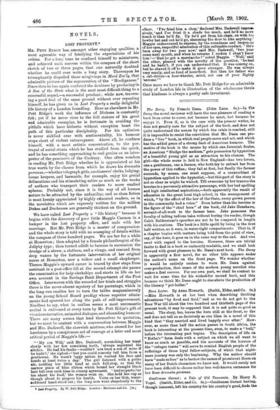NOVELS.
LOST PROPERTY.*
Ma. PET'r RIDGE has, amongst other engaging qualities, a most agreeable way of falsifying the expectations of his
critics. For a long time he confined himself to miniatures, and achieved such success within the compass of the short sketch of two or three pages, that one naturally doubted whether he could ever write a long story. Thereupon he triumphantly dispelled these misgivings in Mord Ent'ly, that admirable picture of the regeneration of the " Hooliganess." Since then he has again confuted the doubters by producing in A Son of the State what is the next most difficult thing to a successful sequel,—a successful pendant ; while now, travers- ing a good deal of the same ground without ever repeating himself, be has given us in Lost Property a really delightful life history of a London foundling. Here as elsewhere in Mr. Pett Ridge's work the influence of Dickens is constantly felt ; yet if he never rises to the full stature of his great and admirable exemplar, he is fortunate in avoiding the pitfalls which have hitherto without exception beset the path of this particular discipleship. For his optimism is never sicklied over with sentimentality, his humour stops short of violent extravagance. Above all, he confines himself, with a most artistic concentration, to the por- trayal of social strata which he has studied from the quick, and he has something approaching to real genius as an inter- preter of the gaminerie of the Cockney. One often wonders in reading Mr. Pett Ridge whether be is appreciated at his true worth by the classes from which he draws his dramatis personae,—whether telegraph girls, auctioneers' clerks, lodging- house keepers, and barmaids, for example, enjoy his genial delineations and his stimulating satire as much as the works of authors who transport their readers to more exalted spheres. Probably not, since it is the way of all human nature to be attracted by the unfamiliar, and as slum fiction is most keenly appreciated by highly educated readers, so in the novelettes which are expressly written for the million Dukes and Duchesses are generally thickest on the ground.
We have called Lost Property a " life history " because it begins with the discovery of poor little Maggie Cannon in a hamper in the lost property office, and ends with her marriage. But Mr. Pett Ridge is a master of compression. and the whole story is told with no stamping of details within the compass of three hundred pages. We see her for a while at Homerton ; then adopted by a female philanthropist of the Jellyby type ; then turned adrift to become in succession the drudge of a shrew, a slattern, and a virago, and rescued from deep waters by the fortunate intervention of her original nurse at Homerton, now a widow and a small shopkeeper. Thence Maggie's upward career is traced by slow steps from assistant in a post-office till at the second attempt she passes the examination for lady-clerkships and starts in life on her own account in the Savings Bank Department of the Post Office. Interwoven with the record of her trials and struggles there is the never-absent mystery of her parentage, which in the long run enables her to turn the tables magnanimously on the young School Board prodigy whose superior attain- ments had spurred her along the path of self-improvement.
Needless to say, what in outline seems a most unromantic recital is enlivened at every turn by Mr. Pett Ridge's gift of vivacious narrative, animated dialogue, and abounding humour. There are many scenes that lend themselves to quotation, but we must be content with a conversation between Maggie and Mrs. Dadswell, the shrewish mistress, who atoned for her harshness by a conspicuous act of courage at a later and most critical period of Maggie's life :-
"' My son said Mrs. Dadswell, scrunching her toast slowly with her few remaining teeth, ` always aspirated his &itches. He had his faults—wouldn't are been a son of mine if he hadn't,' she sighed—' but you could scarcely tell him from a gentleman. He wasn't 'appy unless be washed his face and hands at least twice a day.' The girl listened with a polite air, nodding her little head at each full-stop, so that the narrow piece of blue ribbon which bound her straight black hair fell over each time in clumsy agreement. ' And so partie'lar too about his food,' the woman went on. She held her cup as though about to propose his health. Veins on her thin, water- soddened hand stood out ; the long arm went shapelessly to the
• Lost Property. By W. Pett Ridge. London : Methuen and Co. Dis.j
elbow. 'I've fried him a chop,' declared Mrs. Dadswell impreee sively, 'and I've fried it a shade too much, and he'd no more touch it than he'd fly. Up he'd get from his chair, on with his bowler hat and out he'd go, slamming the door to like anything.' Maggie endeavoured to express, by the roundness and largeness of her eyes, respectful admiration of this estimable conduct. ' He's been away for two year now.' said Mrs. Dadswell, `two year come next month, and when he returns I reckon I shan't know him.'—' Had he got a merstarche ? ' asked Maggie. ' Well,' said the other, pleased with the novelty of the question, he had and he hadn't, if you can understand that. It was coming on, but he shaved it off to make it grow stronger. He was always very manly, and so fond of horseflesh. But then his father was a cab-driver—a four-wheeler, mind, not one of your flighty 'anscens.' " Once more we have to thank Mr. Pett Ridge for an admirable study of London life in illustration of the wholesome thesis
that kindness is always a pretty safe investment.






































 Previous page
Previous page